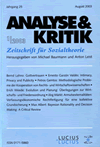Suchergebnisse
"Carlo Martini"
Titel: Applying Formal Social Epistemology to the Real World
Autor: Carlo Martini
Seite: 383-398
Comment on Paul D. Thorn and Gerhard Schurz
Abstract: The claim that diversity and independence have a net positive epistemic effect on the judgments of groups has been recently defended formally by Scott Page, among others, and popularized in Surowiecki’s The Wisdom of Crowds. In Meta-Induction and the Wisdom of Crowds Thorn and Schurz take issue with the claim that more diversity and independence in groups leads to better collective judgments. I argue that Thorn and Schurz’s arguments are helpful in clarifying a number of over-generalizations about diversity and independence that are often circulated in the social epistemology literature. I also argue that the relevant formal arguments are easily misunderstood when presented ’in a vacuum’, that is, without a context of application in mind. I provide a different approach to understanding formal results in social epistemology: With the help of concrete scenarios and the formal literature, I focus on a trade-off between independence and dependence in groups. I show that the approach works well also for another principle in social epistemology; namely, the principle that ’more heads are better than few’.

Social Epistemology
2012 (34) Heft 2
Editorial
The research program of social epistemology developed from a critique of philosophical epistemology around thirty years ago. Since then it has attracted ever-growing attention among philosophers. But social epistemology also offers prolific alignments for the social sciences. The starting point of social epistemology is the elementary fact that most of our knowledge is acquired not by our own autonomous exploration but by relying on information from others: on testimony. This is especially true ...